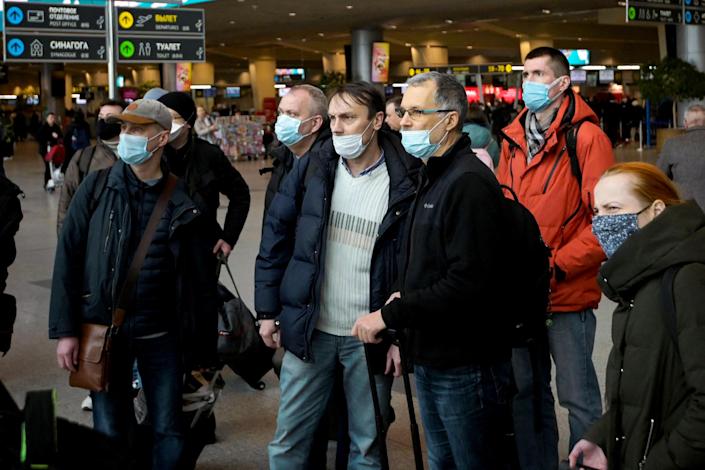Aglaia woke in the early hours to find that war had begun.
Her friend was packing to leave the country, so she rushed to her parents’ house and implored them to do the same.
Aglaia, 23, isn’t from Kyiv, Kharkiv or any other Ukrainian city under attack. She was in St. Petersburg, Russia, more than 500 miles from the fighting.
Her relatives are among tens of thousands of people estimated to have escaped the increasingly hard-line oppression meted out by Russian President Vladimir Putin’s regime as he tries to crush any opposition to his struggling invasion. She asked not to be identified by her last name for fear of reprisals by Russia’s state security services if she ever returns home.
With Russia cracking down on dissent and being hit with more international sanctions than Iran and North Korea, some fear a new “Iron Curtain” may be closing as Putin leaves his country deeply isolated both culturally and economically from a scornful world.
“We were very scared,” said Aglaia, a student and activist who managed to get a rare plane ticket Thursday with her family to the Armenian capital, Yerevan, one of the few nearby places where Russian flights aren’t banned. “We just had this feeling of deep, deep sadness — but also mixed with anger.”


The war’s greatest toll has been on Ukraine, where Russian bombs and shells have killed civilians, leveled residential areas and forced more than 2 million people to flee. But it has disfigured the landscape of Russia in a different way.
Younger liberals, like Aglaia, describe a country closing in on itself as the regime wields Orwellian, totalitarian tactics so brutal that they outstrip anything else seen during Putin’s two decades in power.
On Friday, the Kremlin made it a crime punishable by 15 years in prison to spread “fake news” or to even describe the Ukraine invasion as a “war.” It has forced two of its last remaining independent news broadcasters, TV Rain and Echo Moscow, to go off the air. CNN and the BBC have stopped broadcasting, and The New York Times announced Tuesday that it was pulling its staff out of Moscow. More than 150 Russian journalists have fled the country, according to the Russian investigative news website Agentsvo.
Meanwhile, more than 13,500 protesters who have dared to take to the streets have been arrested, according to the independent human rights group OVD-Info. Social media video shows riot police beating demonstrators and dragging them along the ground.
Meanwhile, the Russian economy is tanking.
International sanctions have been compounded as leading Western brands, such as McDonald’s, Apple and Netflix, voluntarily sever ties. Russia’s currency has lost half its value; 1 ruble is now worth less than three-quarters of a cent. Lines have snaked outside ATMs as residents try to withdraw dollars and salvage what’s left of their savings, many of them unsuccessfully.
“This is the grimmest it has been since Putin came to power 23 years ago,” said Jonathan Eyal, an associate director at the Royal United Services Institute, a London think tank.
“Companies are withdrawing not because they have to, but because there is a feeling that there will be a stain on their corporate reputation,” he said. “Once you are into that bandwagon effect, it is very difficult to reverse.”


Accurate polls are hard to come by; some surveys suggest that around half the population still supports the war. For Putin’s critics, that’s unsurprising given how many people watch state-controlled TV, which serves as little more than a Kremlin mouthpiece and now faces little to no competition from independent or international media.
The networks parrot Putin’s baseless claim that the invasion is a small, targeted operation against “neo-Nazis” controlling Ukraine who have been backed into conflict with Russia by the West.
With Facebook and other social media sites restricted, many people have simply not seen the images of Ukraine’s destruction or their own army’s becoming bogged down and taking heavy losses. Those who consume a diet only of state TV wouldn’t be likely to even know their country was fighting a war that has shocked the rest of the world.
Some have shown support for the war using the letter Z, which was first emblazoned on the Russian tanks invading Ukraine, perhaps to avoid friendly fire. In recent days it has appeared on the jersey of the Russian gymnast Ivan Kuliak, in the merchandise store of the state-controlled broadcaster RT and on bus stands and car windshields in photos shared on social media.
“I am aware that I’m in a bubble of progressive, open-minded people, but some of the conversations you hear on the trains are unbelievable,” Aglaia said. “I heard someone say: ‘Oh, a dollar costs a lot again? Why does that matter if you don’t go to the U.S.?’”
Because the Kremlin hasn’t released official figures, it’s also difficult to know just how many Russians have fled. But from Helsinki and Tbilisi to Istanbul, there are reports of Russian influxes on planes and trains.
Searches for “visa” and “political asylum” spiked on Russian Google last week, a trend first spotted by The Economist, an international magazine.
But actually getting out is easier said than done.
Dozens of countries in North America and Europe have closed their airspace to Russian aircraft. And the state carrier, Aeroflot, has stopped all international flights, a decision industry analysts say would prevent the seizing of planes leased from Western companies under international sanctions.
On the ground, tickets for the twice-daily, 3½-hour train to Helsinki topped 9,000 euros (about $9,800) last week. The cars have been so packed that its operator, Finland’s VR Group, has introduced a third daily service.
“Half of the sky is closed for us, so it’s already hard to leave Moscow,” one Muscovite, 23, said by phone, asking not to be identified because of fears of reprisals by Russian security services.
She described the scenes she has witnessed over the past week, such as the friend detained by police at a subway station for sharing a tweet criticizing the war or the street-sweeping truck that cleared away a display of flowers and candles left outside the city’s Ukrainian Embassy.
“Putin destroyed the lives of three countries — not just Ukraine but also Russia and Belarus, as well,” she said. “It is very important to segregate Putin’s regime and supporters from people who live in Russia. We’ve never wanted this to happen, and we’re strongly against it. But unfortunately they’re doing everything to shut us up.”


Although Putin has denied plans to introduce martial law, rumors alone were enough to prompt Aglaia and her family to make the painful decision to leave. They were also worried they would be targeted for their previous protests against Putin.
Other emigres had posted on social media that they were stopped at the airport by Russia’s FSB security service, which aggressively questioned them and searched their phones. Seeing the posts, Aglaia’s family were careful to clear their messages and photos beforehand.
Left behind were their cat and their family home in St. Petersburg, the city that birthed a leader now waging a war that is driving his own people to flee.
Aglaia — who until now had felt confident there would be a future for her in Russia despite all its flaws — lost money when she suddenly broke off her Moscow apartment rental.
“My landlord told me, ‘I will not give you the whole deposit because you are betraying Putin,’” she recalled, a reminder that her views are far from the consensus.
“We are optimistic that we can return to our home one day — but we are also realistic.”




